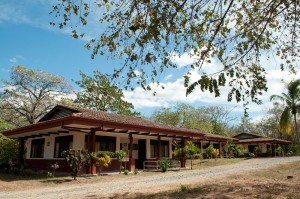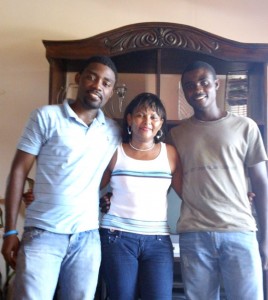The EARTH-La Flor experience: Students face the real world
“You‘re out of your protective bubble.” That’s how Cledy Cachari (‘14, Peru) describes her experience during the EARTH-La Flor program.
As a part of the curriculum, all third year students spend seven weeks living with host families and working with local businesses near the EARTH-La Flor campus in the dry tropics of Guanacaste. There are no rehearsals and no second chances. It’s the real world, with its many professional and social challenges.
Jholenny Córdoba, who is in charge of the third-year EARTH-La Flor program, explains that after two years at the Guácimo campus, where their actions on campus and in the community are supervised, students take on business and community work. They get an authentic experience, living with a local family to expand their connection to the rural Costa Rican culture. Once settled in their new homes, they have to use public transportation to get to their jobs in local businesses, to go to classes at EARTH-La Flor and to do community service projects.
Living like a Costa Rican
Wilner Valbrun (´14, Haiti) familiarly walks in from the porch to the kitchen; the evening heat in Filadelfia, Guanacaste demands that he stays well hydrated. He crosses the living room, where family portraits of Carolina Sánchez and her husband Heyder Machado hang from the walls; he pours himself a glass of water. The dog doesn’t bark. He is at home.
Surprisingly, Wilner doesn’t live here. Actually, Sofia Arguedas, (14 Costa Rica) and Cledy Cachari are being hosted in this house as a part of the EARTH-La Flor program. In fact, Wilner lives with Samuel Kwakye (‘14, Ghana) a few blocks away in Noelia Ochoa’s house. However, the warmth and friendship of the community’s residents have made them one big family in spite of the roads that separate their houses.
For her part, Noelia has become accustomed to having two new children every so often, besides her own 14 year old daughter. In 2012 she hosted two Costa Rican EARTH students. This year has been more international.
“My daughter and I feel accompanied,” she explains. “They are very nice. With them we have shared more, because they stay here during the weekend. Sometimes they help my daughter with homework, or we go to the beach.” In fact Samuel and Wilner have enjoyed the festivals in Playas del Coco, on Costa Rica’s Pacific coast, and have visited Noelia’s niece’s house, also located on the coast, where they are always welcomed with great enthusiasm.
“The nicest moments we have spent here are when we sit down to eat together,” Wilner assures happily. And with good reason: even though he has adapted well to Costa Rican food, Noelia understands their cultural differences and does her best to cook what he likes. She has gone through the unusual experience of making pasta for breakfast, something that isn’t common at all in Costa Rica.
“He finds that Gallo Pinto (the typical breakfast meal of rice with beans) is something to eat for lunch,” Noelia explains.
“We have a good mom,” Wilner acknowledges, while Samuel nods in agreement.
Before they arrive, once a family has been assigned, students are responsible of calling and introducing themselves to their host families. The same goes for the business were they are assigned to work; they have to make an appointment. EARTH leads the way but students have to make the journey from beginning to end.
Host families receive training at EARTH-La Flor in order to improve cultural understanding. For Carolina Sanchez this was very useful, it taught her how to “have better relationships with young people,” and to communicate in a more effective way. Even though, at first she felt intimidated by the responsibility of being a family to Sofia and Cledy (especially Cledy who is far away from home) as time goes by she feels they are her children too, along with her own eight and two year old girls.
Professional responsibilities
Wilner and Samuel both work for CoopeGuanacaste, a cooperative dedicated to the rural electrification of the province. There, they have had to measure farms, facing the everyday challenges of life as an agronomist.
“There was a time when I asked myself: What am I doing here?” Wilner says while laughing. “I was measuring land with a GPS and I found myself on a cliff with a river one side and an abyss on the other. I finished the job sitting, trying to avoid losing balance.”
Samuel adds: “The work we do for this business is related to carbon neutrality. When we got here, they thought we knew how to take those measurements, but we haven’t taken that class yet. Thankfully, there was an EARTH alumnus working here who taught us. Now I feel very happy because I understand that part well. When we get to that class it won’t be hard for us.”
For their part, Cledy and Sofia work in the local agricultural high school, where they have focused on installing a bio-digester. However, they are both very emphatic when they say that there are many challenges in the dry tropics and students can help the community.
“Here we deal with lack of water, contrary to the humid tropics” Sofia explains. “So many people decide to use their land for tourism, when there are ways to make them productive,” Cledy adds.
According to Jholenny, this ability to learn by doing and the track record of the students who have passed through the EARTH-La Flor program have resulted in local businesses seeking out EARTH alumni.
“For me it has been helpful, because this area is similar in climate to my country,” Wilner says. “So it is training for when I go back home”.
With this real-world experience in their education as leaders of change, EARTH students are ready to go out into reality and make the world a better place.
Want to spread the seeds of change? Make a gift to EARTH today to ensure that more students like Wilner, Samuel, Cledy and Sofia can continue receiving a highly experiential education that prepares them to contribute to the well-being of rural communities.






